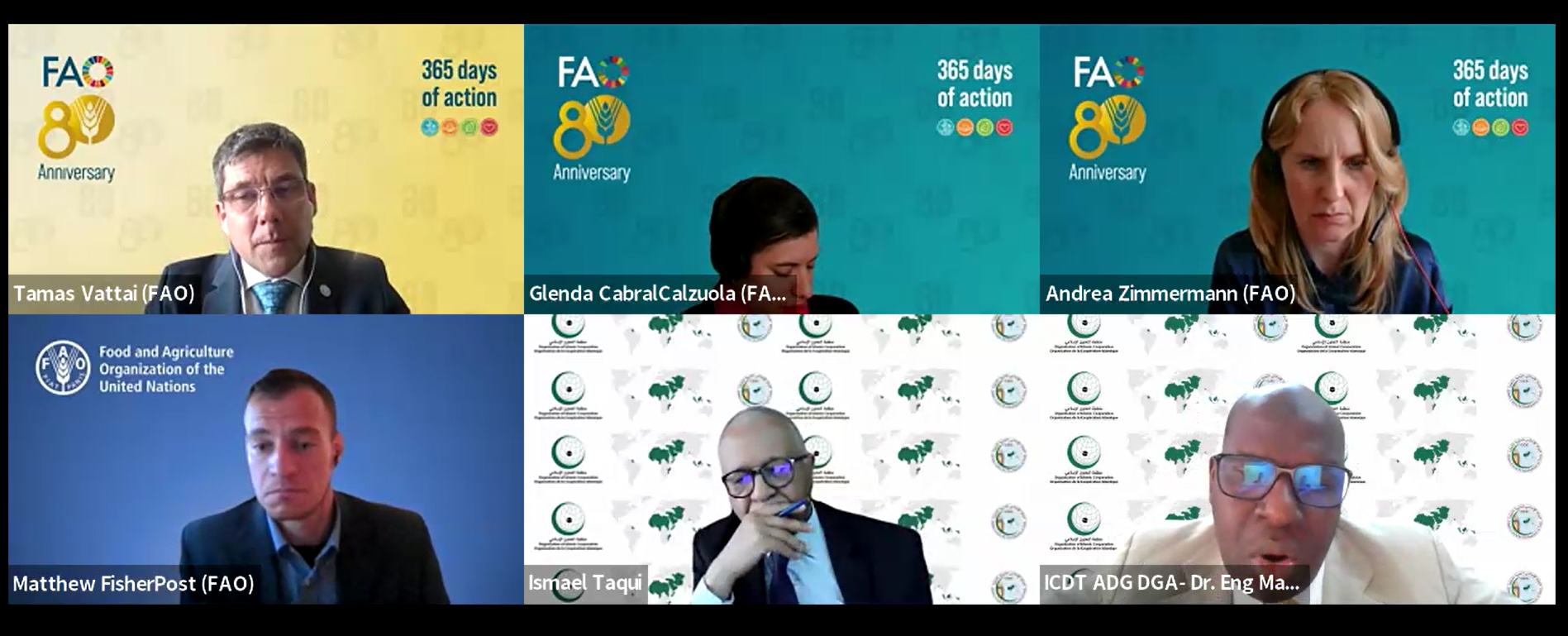Strengthening the link between trade and nutrition in the Arab region

©FAO
In a region grappling with high levels of food insecurity, poor diet quality, and rising health concerns linked to malnutrition, the Food and Agriculture Organization of the United Nations (FAO) Regional Office for the Near East and North Africa (RNE) hosted a timely and high-level webinar exploring the link between trade and nutrition, with the Islamic Center for Development of Trade (ICDT). The webinar, Trade and Nutrition in Arab Countries, brought together a wide range of experts, government officials, and UN partners to discuss how trade policy can be leveraged to support healthier diets in the Arab region.
The virtual event was organized as part of a broader initiative under the Regional Nutrition Capacity Development and Knowledge Sharing Programme, jointly implemented by FAO, the United Nations Economic and Social Commission for Western Asia (UN-ESCWA), and the World Health Organization (WHO), with financial support from the German Federal Ministry of Food and Agriculture (BMEL).
In her opening remarks, Nancy Aburto, FAO Director of Food and Nutrition Division, emphasized the urgency of addressing malnutrition from all angles, including trade policy. “Trade is a powerful enabler of access to safe, diverse, and nutritious food, but it can also act as a double-edged sword if not aligned with nutrition goals,” she said. “This webinar is an opportunity for the region to exchange knowledge, identify policy gaps, and explore how to integrate nutrition-sensitive approaches into trade frameworks.”
Mamoudou Sall, Assistant Director General at the ICDT, also delivered an opening statement that underscored the importance of collaboration to overcome regional trade and nutrition challenges. “National and international trade policies play a crucial role in ensuring the stability of domestic markets by safeguarding local producers, regulating supply and demand, and guaranteeing consumers’ access to essential products,” he noted. He added that “several Arab countries are net importers of food, with imports primarily consisting of essential commodities like cereals, sugar, dairy products, and meat. It is essential for us to collaborate more effectively in order to capitalize on investment opportunities and enhance intra-regional food trade.”
The session featured a presentation by Andrea Zimmermann, FAO Economist, who highlighted global trends in food trade and their nutritional implications. She showed that while trade can significantly improve dietary diversity, which is almost doubling the range of foods available for consumption, it can also contribute to negative health outcomes, such as rising obesity rates, especially in countries with high dependence on food imports.
FAO RNE’s Nutrition and Food Systems Officer, Tamás Vattai provided a regional deep dive, pointing to the critical role of imports in supplying calories across Arab countries. He noted that import dependency exceeds 90 percent in some countries, such as Kuwait and the Gulf States, and stressed the need for policy interventions that promote the import of more nutritious foods like fruits and vegetables, while managing the growing inflow of sugar- and fat-rich products.
Matthew Fisher Post, Policy Economist at FAO RNE, expanded the discussion to include supply chain vulnerabilities. He illustrated how overreliance on a small number of trade partners for key commodities like wheat poses a risk to food security. He emphasized the need to diversify import sources, increase strategic food reserves, and improve logistics infrastructure, particularly in non-GCC countries.
The final presentation, delivered by Moulay Ismail Taqui, Head of Trade Facilitation at ICDT, focused on intra-Arab food trade, regulatory barriers, and the importance of regional cooperation mechanisms such as the greater Arab free trade area.
The webinar concluded with an interactive session, where panelists shared potential policy solutions. These included reducing tariffs on nutritious foods, harmonizing non-tariff measures (e.g., food standards and labeling), introducing taxes on unhealthy food products, and fostering stronger collaboration between ministries of health, trade and agriculture.
The event ended with a renewed call for action to ensure that trade policy not only supports economic growth but also contributes meaningfully to healthier diets and more resilient food systems in the Arab region.
